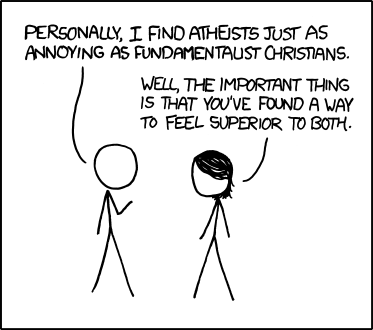I’m not sure what it is about religious belief that robs you of any sense of irony, but that phenomenon is fairly well-documented. Religious people seem to lack the God-given ability to self-examine and see yourself as others see you, which is problematic because most of the rest of us see you as sanctimonious jerks (which is, I suppose, a charge commonly leveled at atheists, so maybe that’s not fair of me to say. SEE HOW IT’S DONE, RELIGIOUS PEOPLE?)
What really doesn’t make sense, however, is the complete loss of a sense of historical perspective that seems to be associated with fervent religious belief. For some reason, they keep falling in the same hole over and over again:
Christian groups have condemned a provocative Spanish play about Jesus called Golgota Picnic (Golgotha Picnic), due to premiere in France. Street protests are planned when the play is performed in the southern city of Toulouse, before moving on to the capital Paris. While urging restraint, Toulouse’s Catholic archbishop said the play “fouled the faith of many believers”.
I mean, haven’t we already done this? Didn’t we do this like… 3 months ago? And wait… didn’t we do the exact same story only 4 months before that? I mean, I could keep writing this stuff again and again, but after a while it kind of gets boring making the same points. Censorship of blasphemy doesn’t create less blasphemy. If anything it makes it more attractive and popular. There are things that are actually worth getting upset about in your own organization. Log in your own eye, speck in others’. Art is supposed to be subversive. Blah blah blah. C’mon guys, get hip to it! [Read more…]

